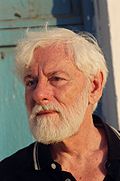Reprinted from Gush Shalom
Though not very profound, it provided a good picture of what actually happened. The three main Israeli protagonists talked freely.
The picture was very disturbing, to say the least. One could say that it was alarming.
The main conclusion is that all our leaders at the time behaved with blatant irresponsibility, combined with stupidity.
TO RECAPITULATE: Lebanon II lasted 34 days, from July 7 to August 14, 2006.
It was provoked by a border incident: Hezbollah forces in South Lebanon crossed the border and attacked a routine Israel patrol. The aim was to capture Israeli soldiers in order to effect a prisoner exchange -- the only way to get the Israeli government to release Arab prisoners.
In the attack, two Israeli soldiers were dragged to Lebanese territory. All the others were killed. We were told that the captives were assumed to be alive. The film shows that the army command knew immediately that at least one of the captives was dead, and the second was assumed to have died, too. In fact, both were killed in the action.
The usual reaction to such an incident is a retaliatory strike "to restore deterrence," such as the bombing or shelling of a Hezbollah base or a Lebanese village. Not this time. The Israeli cabinet started a war.
Why?
The TV story does not provide a convincing answer. The decision was taken at once, after a minimum of deliberations. One gets the feeling that emotions and personal ambitions played a major role.
THE TV investigation consists almost exclusively of the testimonies of the three persons who actually took the decision and conducted the war.
The first was the Prime Minister. Ehud Olmert had arrived at his office only a few months earlier, almost by accident. He had been the Deputy Prime Minister under Ariel Sharon, who had given him this empty title as compensation for not giving him a serious ministry. When Sharon suddenly fell into a permanent coma, Olmert adroitly managed to succeed him.
Throughout his adult life, Olmert had been a political functionary, being loyal to nobody, jumping from party to party and from patron to patron, from the Knesset to the Jerusalem municipality and back, until he achieved his lifetime's ambition: the Prime Minister's office.
Throughout, he had not gathered any military experience at all. He had shirked real army service, and in the end he did some shortened service in the army's judicial department.
The Defense Minister, Amir Peretz, had even less military experience. A labor activist by profession, the former Secretary General of the giant Histadrut trade union, he became the leader of the Labor Party. When his party joined Olmert's new government, Peretz could choose a ministry and took the most prestigious one: Defense.
This combination of two government leaders without any military qualifications is unusual in Israel, a country perpetually at war. The entire country laughed when Peretz was caught by a photographer at an army exercise following the action through binoculars with the lens caps still on.
(Note: You can view every article as one long page if you sign up as an Advocate Member, or higher).






